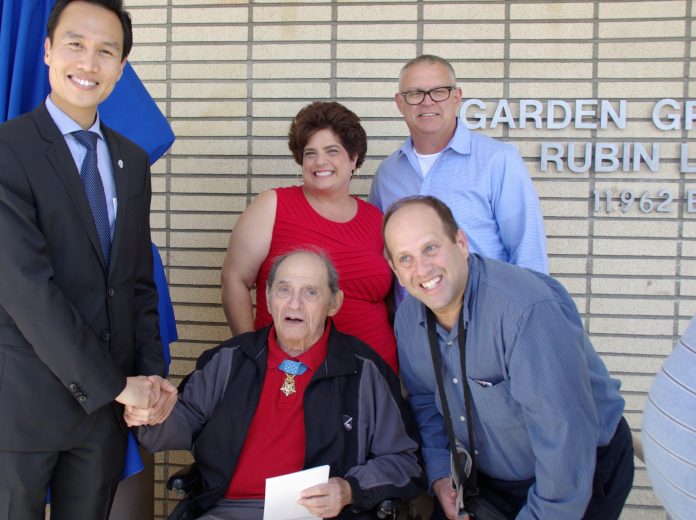By LOREEN BERLIN: A mere nine months ago, Congressional Medal of Honor recipient Tibor Rubin was further recognized when the West Garden Grove Library on Bailey Street was renamed for him.
Rubin, a Garden Grove resident, was a Holocaust survivor; a Congressional Medal of Honor recipient; and had been awarded two Purple Hearts.
"The Garden Grove Tibor Rubin Library" is listed on the front of the building, where a bronze bust of Rubin stands at the front door.
By LOREEN BERLIN: A mere nine months ago, Congressional Medal of Honor recipient Tibor Rubin was further recognized when the West Garden Grove Library on Bailey Street was renamed for him.
Rubin, a Garden Grove resident, was a Holocaust survivor; a Congressional Medal of Honor recipient; and had been awarded two Purple Hearts.
"The Garden Grove Tibor Rubin Library" is listed on the front of the building, where a bronze bust of Rubin stands at the front door.
In his honor, the front of the library was landscaped in red, white and blue plants, representing the flag's stars and stripes.
It was President George W. Bush who presented Rubin the country's highest military honor, the "Congressional Medal of Honor,” on Sept. 23, 2005, at the White House in Washington D.C.
At that time, Rubin was one of only nine Korean War Medal of Honor recipients — 145 were awarded — who was still alive. But two-thirds were killed in action.
The award was presented 55 years after Rubin's service in the Korean War. According to history, the honor was overlooked because of anti-Semitism by a superior. According to studies in the late 1990s by the U.S. Army, discrimination against Rubin and other Jewish veterans was found.
In 2014, the United States Postal Service unveiled a Forever Stamp Prestige Folio with 13 Korean War Medal of Honor recipients, which included Rubin.
Rubin was born in Hungary. In 1942, when Rubin was 13 years old, Nazi soldiers forced his family into concentration camps; Rubin was in the Mauthausen Concentration Camp, where he remained until 1945, when the American's liberated that camp and its prisoners from a sure death in the gas chambers.
His father and mother and a younger sister were not so fortunate.
The Mauthausen-Gusen concentration camp was a large group of German concentration camps built around the villages of Mauthausen and Gusen in Upper Austria, approximately 12.5 miles east of the city of Linz.
Rubin decided he would come to America to defend the country that saved his life, enlisting in the U.S. Army and being sent to the front lines of the Korean War, where Rubin single-handedly slowed an enemy advance for 24-hours, thereby distinguishing himself with extraordinary heroism.
Rubin is also credited with being able to once again slow the enemy, as it advanced; however, he was wounded and captured by the Chinese.
The Chinese told Rubin they would send him back to Hungary, but not to the U.S. Rubin chose to remain with his fellow soldiers in the POW camp for three years, risking death each night as he sneaked out to steal food and medical supplies, saving the lives of 40 other prisoners.
In 1990, Congress designated March 25 as National Medal of Honor Day.
The re-naming of the Garden Grove Library is a well-deserved tribute to Tibor Rubin.
Rubin is survived by wife Evonne, daughter Rosie and son Frank.












